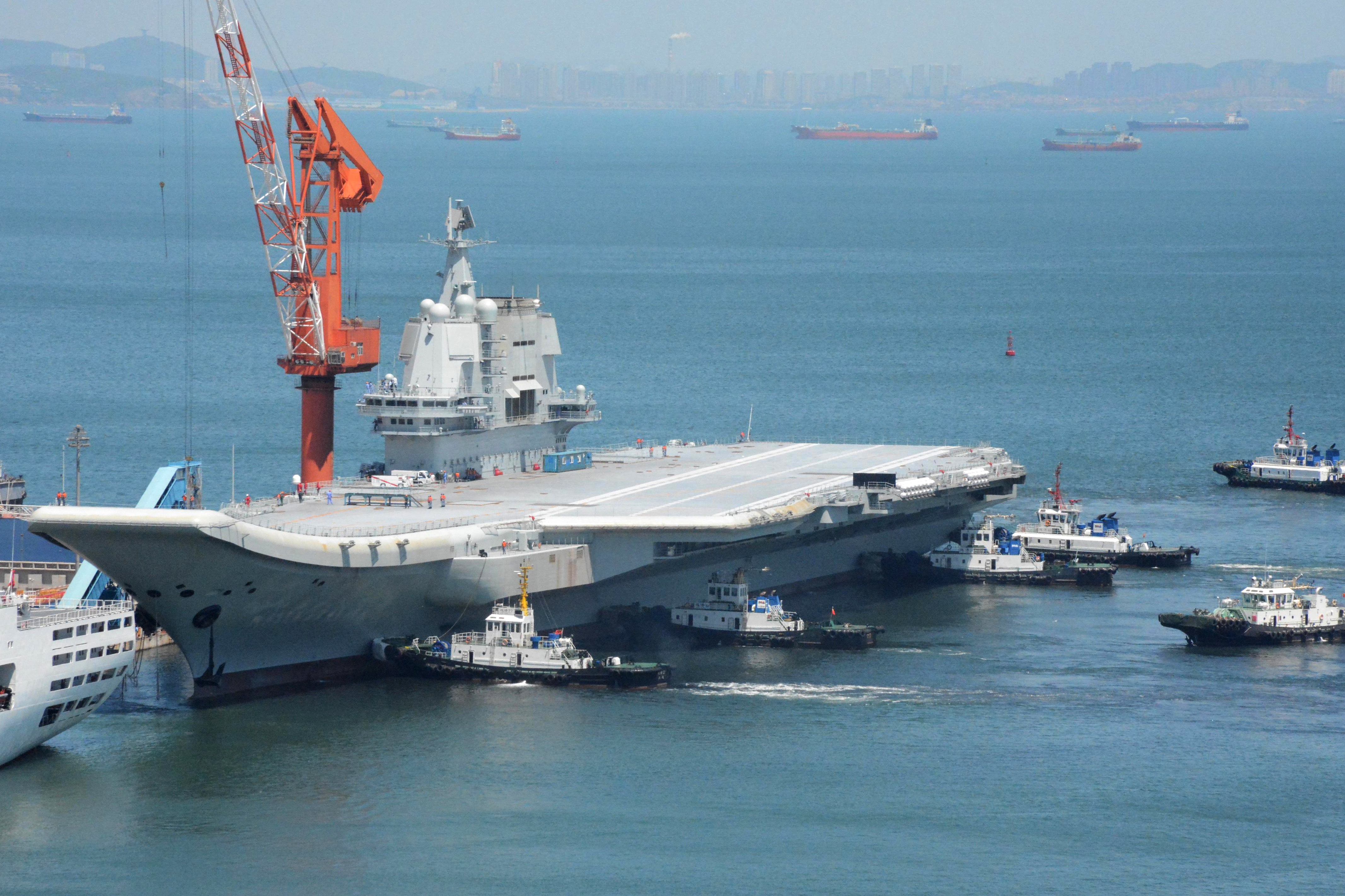
This photo taken on May 18, 2018 shows tugs guiding China's first domestically manufactured aircraft carrier, known as "Type 001A", as it returns to port in Dalian in China's northeastern Liaoning province after its first sea trial. China's first domestically manufactured aircraft carrier started sea trials on May 13, 2018 and returned to port in Dalian on May 18. / AFP PHOTO / - / China OUT
Maria Bastos
Research on maritime security and related politics has increased rapidly with China’s ambitious Maritime Silk Road Initiative (MSRI). While much attention has been paid to MSRI security challenges in the Indian Ocean Region, the South Pacific region, where China is also asserting its presence, has received relatively less attention, in particular among Pakistan security community. This article attempts to provide an overview on how China is being perceived as a security challenge for the South Pacific region, and how regional actors are responding to the Asian giant’s expansion. The progress of China’s MSRI will remain a security challenge to all the regions it crosses, thus contributing towards a strategic change in the security discourses and practices of regional actors.
The South Pacific region is perhaps better known by its paradisiac beaches and exotic people by former colonial powers, namely France and Britain. While the South Pacific region usually does not make inroads into mainstream international political commentary, there are interesting and relevant political dynamics which global security analysts must be familiar with. The rise of China and the MSRI imply that security and foreign policy analysts must be prepared to engage with a diversified and global approach to issues whose scope is no longer limited to local realities.
China’s competition for influence in the region is however not new, and it has been traditionally linked with her most complex international issue – Taiwan. In a region composed of small nation-islands, Taiwan has,however, guaranteed official diplomatic relations with a few, including Kiribati and the Marshall Islands. Scholars and commentators have long ago signalled to this rivalry in the South Pacific region. As the region’s nation-islands are in general vulnerable, and exposed to instability factors, including social, political and economic, external assistance offered by the Asian power has resulted on yet another rivalry source. Financial aid has reportedly been the preferential tool to exercise power over the South Pacific nations. While Australia remains the main financial aid provider to the region, China appears to be increasing her stake, not only in terms of financial aid, but also by deploying a key tool of her diplomacy – soft power. The promotion of Chinese language, Mandarin, and the student exchange, are according to scholars, a preferential tool for China’s assertive incursion in a region where it does not have a geographical presence.
Sino-South Pacific relations are neither new nor threat perception free, particularly to Oceania hegemonic power, Australia. However, the MSRI renews security challenges. Evidence can be found in the latter’s 2017 Foreign Policy White Paper. It is noteworthy that in the document the Australian Government clearly identifies how China can pose a two-pronged challenge to the region: by direct competition with the US over economic and security issues, and by interference into the smaller states affairs. Australia goes an extra mile to urge China to “exercise its power in a way that enhances stability, reinforces international law and respects the interests of smaller countries and their right to pursue them peacefully.” (Foreign Policy White Paper, 2017).
The significance of Australian posture is translated into the kind of partnership chosen to face increasing Chinese influence. By involving Japan, Indonesia, India, and the Republic of Korea, specifically labelled in the document as democracies, Australia aims to be able to control how regional order will unfold in view of Chinese presence in the region. Reified as the Indo-Pacific, Australia is leading the way to re-imagine the joining of seas, islands and continental land into a ‘new’ geopolitical block. To be sure, there are several possible ways to discursively frame this new regional arrangement. One way is to envisage it as a continuation of Western based power politics, considering that the West and the South, beyond a geographical meaning, have also acquired a geopolitical meaning that is unfixed and therefore contingent. If this way is followed, a space for interpretative approaches arises, thus being possible to frame within foreign policy analysis contested factors like identity, and culture. Other way is by considering the traditional balance of power analysis, where this Indo-Pacific partnership, plus the United States, will extend all possible means to balance the crescent of Chinese influence.
The reader may by now be caught in the task of imagining whether this Indo-Pacific posture is desirable, or it is just the result of Western dominated power politics emboldened by a desire of blocking China’s global designs, it is important to be aware of how the latter is persistently trying to go beyond imagined security strategies. A closer look to one of China’s developing bilateral relations in the South Pacific region may provide a rationale to understand how and why regional powers are asserting security strategies to contain China, allegedly fearing a militarization of the region.
Recent rumours about an agreement between China and the small archipelago nation-state of Vanuatu to establish a military base were promptly dissipated by both countries’ officials last April. Further re-assurances were reportedly uttered by Beijing toward Canberra, and yet, a close look at the Sino-Vanuatu relationship deserves attention. First, the significance of Australian White Paper must be taken into consideration, and secondly, the kind of uncertainties and anxieties generated by China’s MSRI elsewhere, reinforces threat perceptions in the South Pacific region. Analysts and commentators on Australian security and foreign policy have been trying to make sense of why China is so keen on keeping Vanuatu under its sphere of influence. A variety of reasons have been uttered, including China’s interest on expanding fishing activities, or even a desire to have access to an area that could potentially be used for nuclear tests. To be sure, Vanuatu’s location a mere one thousand miles north-east of the Northern Australian coast, may also be deemed a valuable a strategic military asset, should a naval confrontation between China, Australia and the United States arise.
Whether Sino-Vanuatu relations should be simply framed within the spirit of ‘economic development’ and ‘South-to-South’ cooperation, or whether analysts should keep enough space to consider the real strategic potential Vanuatu offers to China resulting in a security quagmire for Australia/United States, remains an increasingly difficult position to take. Doubts about Chinese capability to transform international politics should, at this point, no longer persist. China has challenged Western-framed approaches to developmental, security politics, and has been able to master soft-power like no other great power before her, which, may obfuscate the off-guard analyst. Therefore, China’s foreign policy, as it is, is becoming increasingly complex, and needs to be subjected to increased scrutiny and to dispassionate analyses.
The consequences of the MSRI are yet to be fully established, be it in the Indian Ocean region, the Indo-Pacific Region, the Artic Region, or the Atlantic. Imperial powers, like Britain and Portugal knew too well the importance of having full control of the seas. The United States still privileges the strategic importance of having military bases, including naval ones, across the globe. Any closer look to a world map, aided by a flow of imagination will send the reader into a voyage marked by Chinese presence at key geopolitical spots. This was not always the case.
The new reality, aided by a romantic attitude that conflates past commercial successes with present geo-strategic needs appears to be here to stay. While the Australian dominated politics of the Indo-Pacific currently show determination to establish the limits of Chinese influence in the region, the potential for an asymmetric power distribution remains high, considering China’s lead on soft-power management. Following developments on the politics of China’s MSRI is therefore an imperative task for any serious security and foreign policy analyst studying Chinese foreign relations.
Maria Bastos is a PhD Candidate at the DPIR, University of Westminster, UK. She teaches at the School of Governance and Society, UMT, Lahore.







